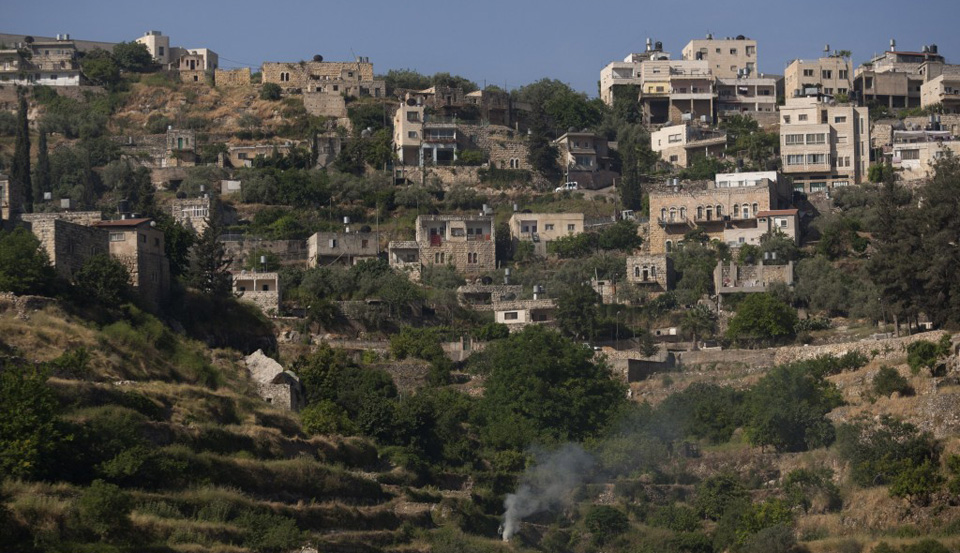
This week marks the 50th anniversary of the Six-Day War fought June 5-10, 1967, by Israel and the neighboring states of Egypt (known then as the United Arab Republic), Jordan, and Syria. In a swift victory, Israel seized control of the Gaza Strip and the Sinai Peninsula from Egypt, the West Bank and East Jerusalem from Jordan, and the Golan Heights from Syria, tripling the geographical area under Israeli control. On June 11, a ceasefire was signed.
Arab casualties were far heavier than those of Israel: Fewer than a thousand Israelis had been killed compared to over 20,000 from the Arab forces. Israel’s military success was attributed to the element of surprise, an innovative and well-executed battle plan, poor leadership of the Arab forces, and faulty intelligence on the Arab side.
The war produced momentous consequences, including the displacement of civilian populations: 300,000 Palestinians fled the West Bank and about 100,000 Syrians left the Golan to become refugees. Across the Arab world, Jewish minority communities were either expelled or enticed to leave, the refugees departing mostly for Israel or Europe.
Following the war, Israel experienced a wave of national euphoria. The country’s economy flourished due to an influx of tourists, new immigrants and donations, as well as the extraction of oil from the Sinai. Jews now had access to historic sites such as cemeteries and the Western Wall in the Old City of Jerusalem. In Hebron, Jews gained access to the Cave of the Patriarchs (the second most holy site in Judaism, after the Temple Mount), Rachel’s Tomb in Bethlehem and Joseph’s Tomb in Nablus.
The war inspired the Jewish diaspora to unprecedented support for Zionism, including among Jews in the Soviet Union and other Eastern European socialist countries, where a series of antisemitic purges occurred. Over 11,000 Polish Jews left for Israel during the 1968 Polish political crisis and the following year. Many Soviet Jews subsequently applied for exit visas and began protesting for their right to emigrate to Israel. Under diplomatic pressure from the West, the USSR began granting exit visas to Jews in growing numbers. From 1970 to 1988, some 291,000 Soviet Jews emigrated, 165,000 to Israel and 126,000 to the United States.
After the war, the entire Soviet bloc, with the exception of Romania, broke off diplomatic relations with Israel. Other countries in Africa and Asia followed suit.
On November 22, 1967, the United Nations Security Council adopted Resolution 242, the “land for peace” formula, which called for Israeli withdrawal “from territories occupied” in 1967. Resolution 242 recognized the right of “every state in the area to live in peace within secure and recognized boundaries free from threats or acts of force.” It remains the principal document of international law to which diplomatic negotiators refer in trying to reclaim Palestinian lands.
While Israel returned the Sinai to Egypt in 1978, after the Camp David Accords, one of the foreign policy successes of President Jimmy Carter, the other territories have remained under Israeli control. Israeli policy has been to introduce Jewish settlements on the land in the West Bank and the Golan in what is apparently a long-term plan of incorporating these territories into the Israeli nation, with separate laws and conditions for Jewish and Palestinian citizens. Israel removed Jewish settlements from Gaza but still controls its borders and economy. Some have called Gaza the largest open-air prison in the world.
The notion of withdrawal from the Occupied Territories leading to an independent Palestinian state alongside Israel, which has been official policy for five decades, is now almost out of reach, and other solutions do not seem workable either. It will take some extremely creative diplomatic maneuvering and social re-engineering to arrive at a satisfactory conclusion to this conflict.
This year also marks other notable anniversaries: 10 years of Israel’s blockade of Gaza; 70 years since the Nakba and ethnic cleansing of Palestine began following the 1947 U.N. partition of the land against the will of the indigenous people; and 100 years since the Balfour Declaration, by which Britain—which would hold a Mandate over this area in the aftermath of World War I and the breakup of the Ottoman Empire—set the stage for the Zionist movement later to establish a Jewish state.
June 5-10 will be an international week of action to demand an end to Israel’s military occupation as part of a commitment to justice for all Palestinians, whether in historic Palestine or in exile. These actions are a response to a call from Palestinians to send a clear message: Enough is enough, and Israel must end all its oppression of Palestinians for freedom and equality to prevail.
“Israel’s actions since 1967 make clear that the occupation was never meant to be temporary,” declares the U.S. Campaign for Palestinian Rights. “It is not an aberration. It is just the latest extension of Israel’s ethnic cleansing and subjugation of Palestinians, which continues to this day.”
Some critics of Israel’s military occupation have stated that the severe delineation of rights and privileges between Jews and Palestinians—civil rights, residency, freedom of travel, access to water, land, healthcare, education and an unbiased judicial system—is tantamount to apartheid.
Tax-paying U.S. residents and citizens are complicit in this system through the billions of dollars of weapons the U.S. gives Israel each year, and through the diplomatic protection it provides Israel in international organizations to prevent it from being held accountable. Political leaders and elected representatives have to think twice about putting their careers on the line if they dare to cast a vote critical of Israel.
Eventually the situation will change when enough people, in the U.S., in Israel and Palestine, and worldwide, make “business as usual” too costly or embarrassing to maintain. In the meantime, so many other pressing issues call for attention.
A free Palestine may not be an impossible dream, but it will take an unprecedented force of human nature to bring it about.
Sources: Wikipedia and U.S. Campaign for Palestinian Rights.

MOST POPULAR TODAY


Zionist organizations leading campaign to stop ceasefire resolutions in D.C. area

Communist Karol Cariola elected president of Chile’s legislature

High Court essentially bans demonstrations, freedom of assembly in Deep South

Afghanistan’s socialist years: The promising future killed off by U.S. imperialism






Comments